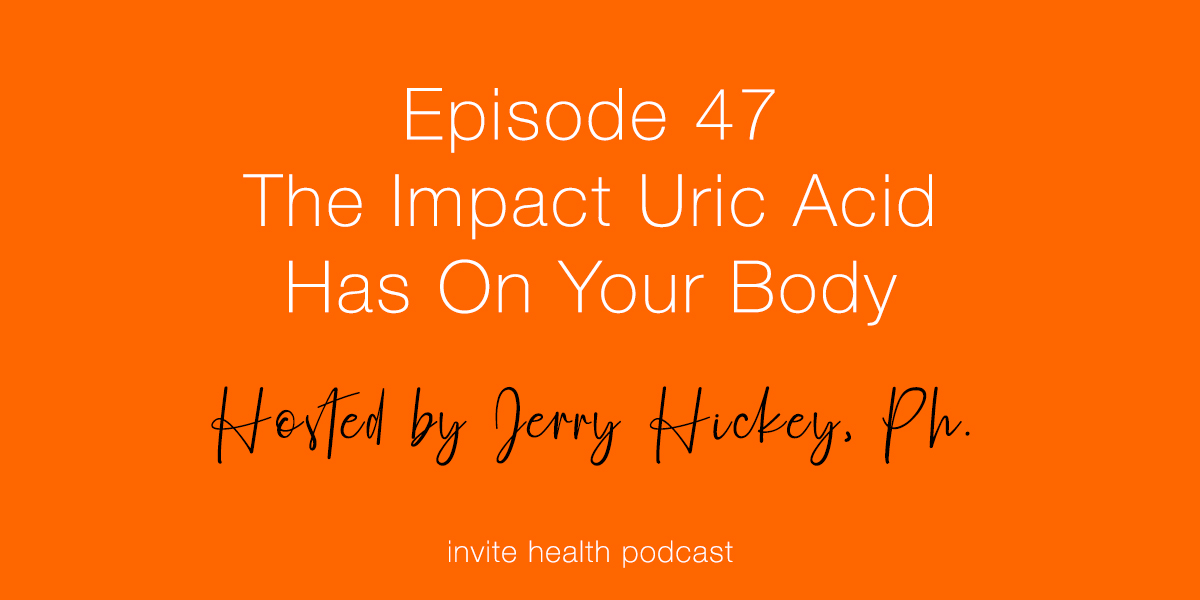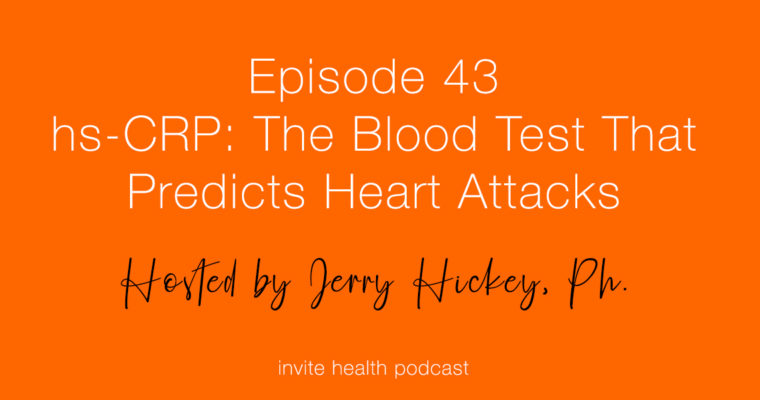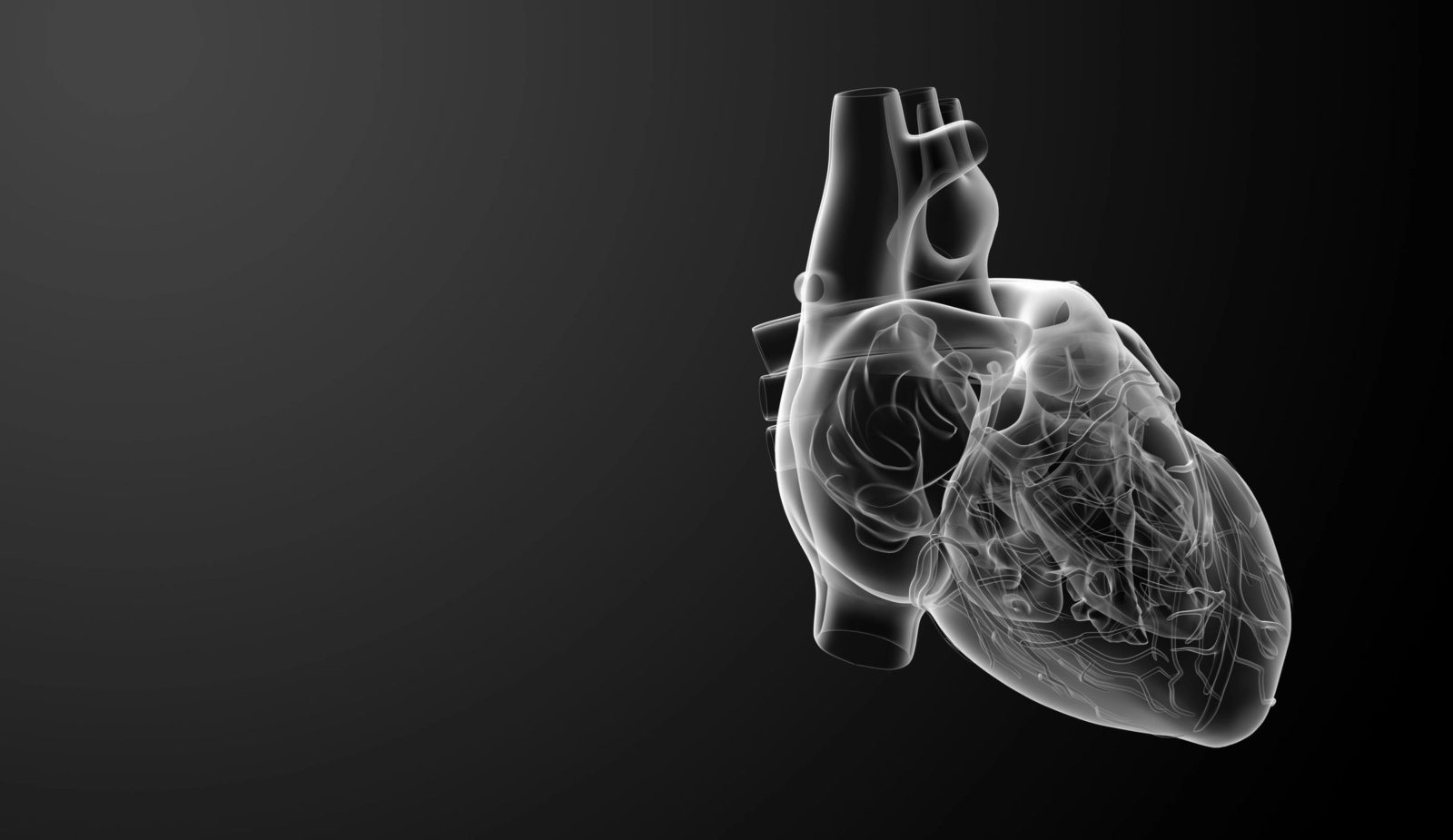InVite Health Podcast, Hosted by Jerry Hickey, Ph.
Subscribe Today!
Uric acid is normally found in your blood and in your urine. Higher levels can cause a kidney stone, painful arthritis, kidney damage or can trigger a stroke or a heart attack. Here’s what you need to know.
The Basics
There is a normal blood range for uric acid and the range depends on the lab but may be as low as 2.5 to as high as 9 and this may be normal for some labs. Uric acid (UA) is normally lower in women and for all of us you generally want your UA level to be below 6 to be safe.
A painful and dangerous condition called gout is caused by UA collecting in your joints and other body tissues. In gout, needle-like crystals build up in your joints, in your blood vessels, in your skin, but also in your heart and not all people with elevated uric acid will develop symptoms though.
The problem is that the most current research shows that even if your within the normal blood range for uric acid, far below the level connected with gout, but if it is toward the higher end of normal, you have a heightened risk of dying from a stroke or heart attack if you also have other risk factors for heart disease such as elevated blood sugar, obesity, or high blood pressure.
This is a problem because some clinicians will note the UA level as lying within the normal range and therefore they believe you have no additional risk.
I have reviewed thousands of blood tests for clients over the years, and the test for uric acid is rarely ordered even in patients with heart disease or diabetes; research shows this is could be a very serious omission.
How does your body make uric acid?
Some foods have ingredients in them called purines. An enzyme in your body called xanthine oxidase converts these purines into UA.
UA in itself is not a bad thing and it functions as a powerful antioxidant so at the low end of normal uric acid is very protective.
The problem is that uric acid is very poorly soluble in urine so it is hard to break down. If your level is too high it tends to not be fully flushed out when you urinate, it builds up in your system and converts into dangerous and painful crystals. For instance a major symptom of gout which is due to a high level of uric acid in the system, is extreme pain in your big toe because the toe joint is caked up with crystals.
What foods can negatively impact uric acid?
So what foods contain the purines that raise uric acid? Eating red meat such as steak, but especially organ meats such as liver, kidney, and sweetbreads increases your uric acid.
Seafood such as anchovies, herring, sardines, mussels, scallops, trout, and tuna also increase uric acid. That’s because these foods have insoluble purines that are converted into uric acid. However, not all purines are a problem.Coffee and tea contain purines but they are water soluble, they do not have to be converted into uric acid, are easily flushed out in your urine and do not raise uric acid.
Interestingly, my favorite tea – Green Tea – actually helps prevent kidney stones in general and high quality coffee may slash the risk of gout according research from a cooperative team of researchers from Canada and Harvard.
Some vegetables such as mushrooms, cauliflower and asparagus also contain purines however, eating these vegetables in moderation is neither connected to elevated UA nor gout.
Alcoholic beverages especially beer and wine, and also sugary foods, especially those sweetened with fructose are connected with both elevated UA and also with gout.
In a study from the University of California Davis, performed in 2015, consuming high fructose corn syrup sweetened drinks increased UA and blood fats such as triglycerides in just two weeks in young healthy volunteers. Note that dried fruit and fruit juice are loaded with fructose so these should be avoided also.
Suffering from painful kidney stones? Here is what you need to know. Click here >>
Elevated uric acid is common with diabetes and obesity; two extremely common conditions. Uric acid was first discovered in 1776, a Swedish chemist found it inside kidney stones. In 1882, a Ukrainian chemist found out it uric acid could be made out of your body’s waste products.
Some individuals have a heightened risk of gout; they have genes that prevent them from adequately flushing out UA. They may also have a problem with the sugar called fructose.
Thiazide diuretics such as hydrochlorothiazide or chlorthalidone are often prescribed to treat high blood pressure or swelling due to fluid retention. These drugs can raise UA levels by interfering with the excretion of uric acid in the kidneys.
Uric acid can create crystal deposits in your organs and joints which cause inflammation and damage. A very high concentration of UA can trigger gout. Gout is a very painful condition; needle-like crystals of uric acid build up in your joints, blood vessels, heart, and skin.
In some individuals gout can occur even with very normal blood levels of uric acid. If you have gout you want to minimize your intake of a mineral called molybdenum; excess molybdenum activates the enzyme that converts purines into UA. You need molybdenum, just don’t overdo it.
Lowering Your Uric Acid Level
- Drink plenty of fluids. Stay well-hydrated, including plenty of water. Limit how many sweetened beverages you drink, especially those sweetened with high-fructose corn syrup.
- Limit or avoid alcohol. Especially beer and wine
- Limit your intake of meat, fish and poultry. A small amount may be tolerable, but pay close attention to what types — and how much — seem to cause problems for you.
- Maintain a desirable body weight. Both the Dash Diet and the Mediterranean Diet have been shown to lower uric acid. These are very sensible ways of eating
Thank you for tuning in to the Invite Health Podcast. You can find all of our episodes for free wherever you listen to podcasts or by visiting www.invitehealth.com/podcast. Make sure you subscribe and leave us a review! Follow us on Facebook, Twitter and Instagram at Invite Health today. We’ll see you next time on another episode of the Invite Health Podcast.






